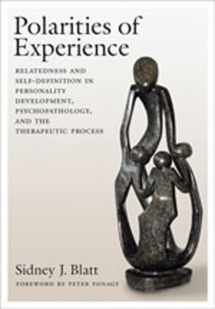
Polarities of Experiences: Relatedness and Self-definition in Personality Development, Psychopathology and the Therapeutic Process
Book details
Summary
Description
In this groundbreaking book, Sidney J. Blatt proposes that psychological development is a lifelong personal negotiation between the two fundamental dimensions of relatedness and self-definition. Psychological development, from youth to old age, is a synergistic balancing act between these two polarities, with most individuals favoring to varying degrees either the anaclitic (relatedness) dimension or the introjective (self-definition) dimension. Exaggerated emphasis on one developmental line at the expense of the other, however, can lead to a variety of mental disorders.Within this framework, mental disorders are seen not as clusters of present or absent symptoms, as in the current DSM diagnostic system, but rather as compensatory exaggerations of the normal polarities of relatedness and self-definition. The author argues that this conceptualization of personality development has clear implications for therapy and describes intriguing research indicating that anaclitic and introjective persons respond differently to psychotherapy. The author applies this model in great detail to the process of therapeutic change, with striking implications for further research. Clinical researchers, therapists, psychiatrists, and graduate students will find this book a rich source of new ideas for research and practice.


We would LOVE it if you could help us and other readers by reviewing the book
Book review



